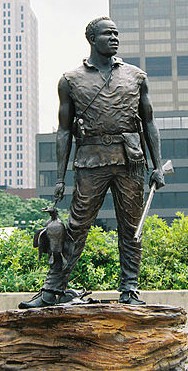York (Lewis and Clark)
| York | |
|---|---|

York statue at Riverfront Plaza/Belvedere, Louisville, Kentucky
|
|
| Born | 1770 Ladysmith, Caroline County, Virginia |
| Died | before 1832 (aged 62?) unknown |
| Cause of death | cholera? |
| Resting place | unknown |
| Nationality | American |
| Occupation | slave, explorer, businessman |
| Employer | slavemaster, U.S. government, self-employed |
| Home town | Ladysmith, Caroline County, Virginia |
| Movement | Lewis and Clark Expedition |
| Spouse(s) | 1 |
| Parent(s) | Rose |
| Relatives | Juba (brother), Nancy (sister) |
| Military career | |
| Allegiance |
|
| Service/branch |
|
| Years of service | 1803-1806 |
| Rank | sergeant (honorary posthumous - Presidential citation) |
| Unit | Corps of Discovery |
York (1770 – before 1832) was an African-American explorer best known for his participation with the Lewis and Clark Expedition. Enslaved by William Clark's father and passed down through a will to William Clark, he performed hard manual labor without pay, but participated as a full member of the expedition. Like many other expedition members, his ultimate fate is unclear. There is evidence that after the expedition's return, Clark had difficulty compelling York to resume his former status, and York may have later escaped or been freed, but nothing is entirely clear on this.
York was born in Caroline County near Ladysmith, Virginia. He, his father, his mother (Rose) and younger sister and brother (Nancy and Juba), were enslaved by the Clark family. York was William Clark's servant from boyhood, and was left to William in his father's will. He had a wife whom he rarely saw, and likely lost contact with her after 1811 when she was sold/sent to Mississippi. It is not known if York fathered any children.
Historian Robert Betts says that the freedom York had during the Lewis and Clark expedition made resuming enslavement unbearable. After the expedition returned to the United States, every other member received money and land for their services. York asked Clark for his freedom based upon his good services during the expedition. According to one account discussed below, Clark eventually gave him his freedom.
It is shown that York had gained a little freedom while on the expedition with Lewis and Clark. It is mentioned in journals that York went on scouting trips and going to trade with villages so he saw what freedom was like while doing that. He might have also been shown respect by Clark because Clark named two geographic discoveries after him; York's Eight Islands and York's Dry Creek. Also they took a poll of where they should stay over one winter and York's opinion was recorded even though it was last. This shows that York had a taste of freedom and possibly gained some respect by the fellow travelers on the expedition.
As to York's later life and death, semi-contemporaries Washington Irving and Zenas Leonard give contradictory accounts. When Irving interviewed Clark in 1832, Clark claimed to have freed York, but that York regretted being free because he was a failure at business, and died trying to get back to serve his master as a slave again in St. Louis. Some contemporary historians doubt the accuracy of Clark's story, for it reflects pro-slavery arguments that Africans were happy to be slaves, and could not lead successful lives as free people. However, manumission laws and practices of the era often required freed slaves to leave the area, and their family and friends.
...
Wikipedia
